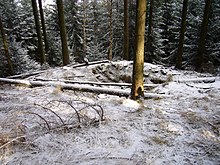You can help expand this article with text translated from the corresponding article in Czech. (June 2018) Click [show] for important translation instructions.
|

Czechoslovak resistance to the German occupation of the Protectorate of Bohemia and Moravia during World War II began after the occupation of the rest of Czechoslovakia and the formation of the protectorate on 15 March 1939. German policy deterred acts of resistance and annihilated organizations of resistance. In the early days of the war, the Czech population participated in boycotts of public transport and large-scale demonstrations. Later on, armed communist partisan groups participated in sabotage and skirmishes with German police forces. The most well-known act of resistance was the assassination of Reinhard Heydrich. Resistance culminated in the so-called Prague uprising of May 1945; with Allied armies approaching, about 30,000[1] Czechs seized weapons. Four days of bloody street fighting ensued before the Soviet Red Army entered the nearly liberated city.
- ^ Mahoney 2011, p. 191.